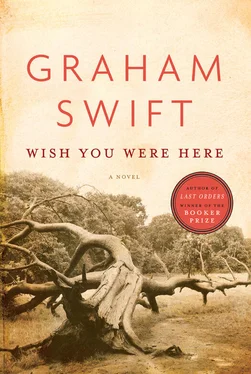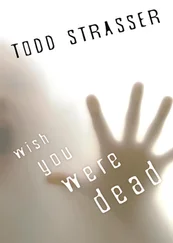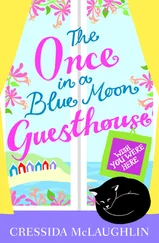Well, one way or another, they’d never gone down the road of children. There isn’t, now, that complication. He’s definitely the last of the Luxtons. There’s only one final complication — it involves Ellie — and he’s thought that through too, seriously and carefully.
Which is why he’s up here, at this rain-lashed window, from where he has the best view of the narrow, twisting road, Beacon Hill, which has no other purpose these days than to lead to this cottage. So he’ll be alerted. So he’ll be able to see, just a little sooner than from downstairs, the dark-blue roof, above the high bank, then the nose of the Cherokee as it takes the first, tight, ascending bend, past the old chapel. The Cherokee that’s done so much hard journeying in these last three days.
The road below him, running with water, seems to slither.
Of course, she might not return at all. Another option, and one she might be seriously contemplating. Though where the hell else does she have to go to?
It’s all gone mad, Jack thinks, but part of him has never felt saner. Rain blurs the window, but he looks through it at the rows of buffeted caravans in the middle distance to the right, beyond the spur of land that slopes down beneath him to the low mass of the Head. All empty now, of course, for the winter.
‘Well, at least this has happened in the off season.’
Ellie’s words, and just for a shameful instant it had been his own secret flicker of a thought as well.
He looks at the caravans and even now feels their tug, like the tug of the wind on their own thin, juddering frames. Thirty-two trembling units. To the left, the locked site office, the laundrette, the empty shop — grille down, window boarded. The gated entrance-way off the Sands End road, the sign above it swinging.
Even now, especially now, he feels the tug. The Lookout Caravan Park, named after this cottage (or two knocked into one), in turn named after its former use. He feels, himself now, like some desperate coastguard. Ellie had said they should change the name from The Sands. He’d said they should keep it, for the good will and the continuity. And so they had, for a year. But Ellie was all for them making their own mark and wiping out what was past. There must be no end of caravan sites called The Sands, she’d said, but The Lookout would stand out.
It could work two ways, he’d said, ‘Lookout’—attempting another of those solemn-faced jokes of the kind his father once made.
Ellie had shrugged. So, didn’t he like the name of the cottage? It wasn’t the name they’d given it, after all. Lookout Cottage (usually known as just ‘The Lookout’). They could always change the name of the cottage. Ellie was all for change. She was his wife now. She’d laughed — she’d changed her name to Luxton.
But they hadn’t. Perhaps they should have done. And before the new season began, for the sake of uniformity but also novelty, and because Ellie thought it sounded better than The Sands, the site had become, on the letterhead and the brochure and on the sign over the gate, as well as in plain fact, The Lookout Park.
And it was lookout time now all right.
MY ELLIE. She’d changed her name (at long last) to Luxton, just as, once, his mother had done. And ‘Luxton’, so his mother had always said, was a name to be proud of. It was even a name that had its glory.
Both Jack and Tom had grown up with the story, though, because of the eight years between them, not at the same time. But after Tom was born it acquired the double force of being a story about two brothers. It was Vera who mainly had the job of telling it, shaping it as she thought fit — though there wasn’t so much to go on — for the ears of growing boys. Their father may have known more, but the truth was that, though the story had become, quite literally, engraved, no one had ever completely possessed the facts.
There was a medal kept at Jebb Farmhouse, up in what was known as the Big Bedroom: a silver king’s head with a red-and-blue ribbon. Once a year, in November, it would be taken out and polished (by Vera, until she died). Jack and Tom had each been given, and again by Vera, their separate, private, initiatory viewings. It was anyway for all to see that among the seven names, under 1914–18, on the memorial cross outside All Saints’ church in Marleston village there were two Luxtons: ‘F.C. Luxton’ and ‘G.W. Luxton’, and after ‘G.W. Luxton’ were the letters ‘DCM’.
Once, most of a century ago, when wild flowers were blooming and insects buzzing in the tall grass in the meadows along the valley of the River Somme, two Luxton brothers had died on the same July day. In the process, though he would never know it, one of them was to earn a medal for conspicuous gallantry, while the other was merely ripped apart by bullets. Their commanding officer, Captain Hayes, who had witnessed the act of valour himself, had been eager, that night, to write the matter up, with his recommendation, in the hope that something good — if that was a fair way of putting it — might come of the day’s unspeakabilities. But though he knew he had two Luxtons under his command, George and Fred, he had never known precisely which was which. In their full kit and helmets they looked like identical twins. They all looked, he sometimes thought, like identical twins.
But the two Luxton boys were now equally dead anyway. So he had opted for George (it was the more patriotic name), intending to corroborate the matter the next morning, if he had the chance, before his dispatch was sent. There had been much else to concern him that night. But he never did have the chance, since by seven a.m. (another radiant summer’s day, with larks), not long after blowing his whistle yet again, and only obeying a futile order that elsewhere along the line had already been cancelled, Captain Hayes too was dead.
So it was George, not Fred, who got a DCM — which was only one medal down (Vera liked to make this point) from a VC — and neither brother would ever dispute it.
No then-surviving or subsequent member of the Luxton family ever had cause to challenge what was set down in the citation and carved in stone. No one else had contested it, though no one had suggested, either, that Fred was any sort of slouch. They were both heroes who’d volunteered and died for their country. It was the general, unspoken view of the slowly diminishing group who gathered every November round the Marleston war memorial that all those seven names on it were the names of heroes. Many not on it had been heroes too. There was perhaps a certain communal awkwardness about the local family names that were represented (only the Luxtons featured twice), perhaps even a particular awkwardness about George’s DCM — as if it had been merely attention-seeking of him to capture single-handedly an enemy machine-gun and hold it under impossible odds (so Captain Hayes had written) till he was cut down by crossfire. On the other hand, it would have been in the shabbiest spirit not to honour a thing for what it was. George Luxton and his DCM were in fact the reason why — even long after another world war — many residents of Marleston village and its vicinity turned up in November with their poppies when otherwise they might not have done. The Luxtons themselves, of course, were always there. George Luxton (which was not to forget Fred) was the village hero and no one (not even Jimmy Merrick of neighbouring Westcott Farm) could deny that he was the Luxtons’ claim to fame.
Only Jack knows, now, how Vera told the story. He never confirmed it expressly with Tom. On the other hand, he had no reason to suppose that Tom didn’t get exactly the same rendition. His mother had given Jack the plain — proud, illustrious — facts, a man’s story coming from a woman’s lips. And all the better for it, Jack would later think. His dad would have made a mumbling hash of it. At the same time, like some diligent curator, she’d placed the medal itself before him. Jack couldn’t remember how old he’d been, but he’d been too young to recognise that he was going through a rite of passage arranged exclusively for him. It was probably early one November, around the time of Guy Fawkes’ Night, when they’d light a bonfire at the top of Barton Field, his dad (it was still just the three of them) having splashed it first with paraffin. So in Jack’s mind Remembrance Day was always linked with flames and fireworks.
Читать дальше








![Питер Джеймс - Wish You Were Dead [story]](/books/430350/piter-dzhejms-wish-you-were-dead-story-thumb.webp)



